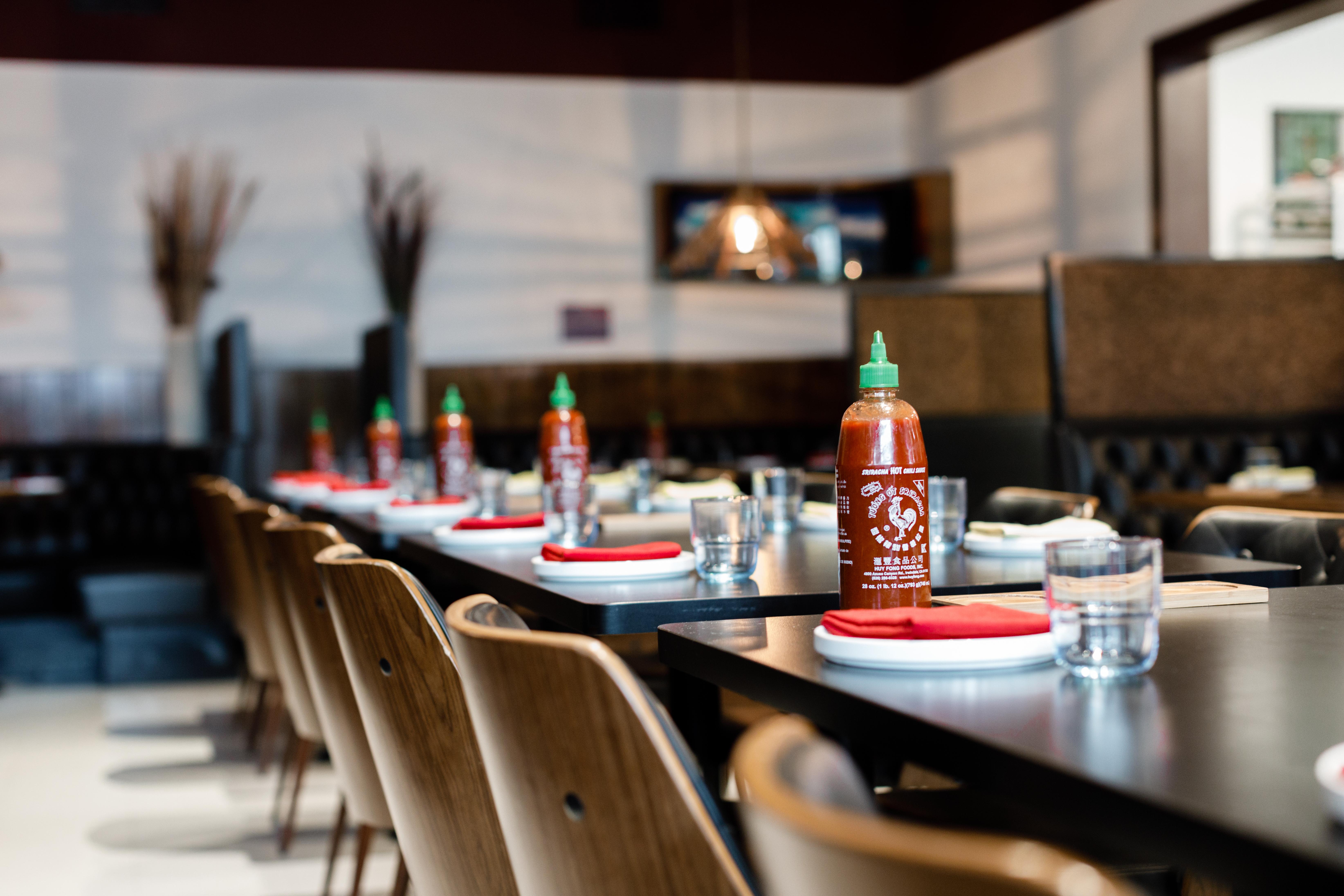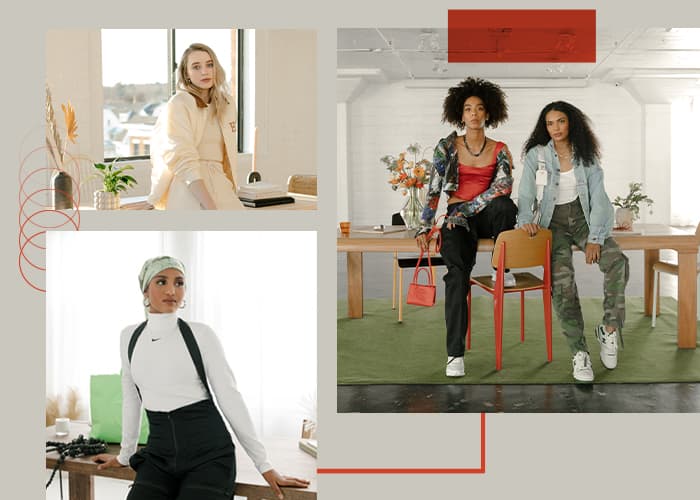By Kevin Kosanovich and Hadjj Mare
Southwest Detroit’s native son, George Azar, is working to turn his neighborhood, and Detroit, into a culinary destination with his amazing restaurant, Flowers of Vietnam. What began as an unlicensed pop-up restaurant in a crumbling former coney island quickly turned into a national sensation, garnering rave reviews from critics throughout the country, and being named one of GQ’s best restaurants of 2017. We recently caught up with George to talk about sneakers, food, music, and the state of the city.
The following interview has been lightly edited for length and clarity.
StockX: George, would you please introduce yourself?
George Azar: I’m George Azar, from southwest Detroit, proper. I’m the chef/owner of Flowers of Vietnam. That’s my bag!
Tell us about where it all started. Tell us about your family history.
All my family, cousins and everything, grew up in my neighborhood too. My dad came here when he was 17 and my mom when she was three. So I’m a first generation Detroiter. I’m Catholic and Palestinian. I say Catholic not because I’m religious but because people don’t realize that you can be Middle Eastern, Arabic, and be Catholic–because one’s an ethnicity and one’s a religion. People are like, “did you convert?” No!

Where did you grow up?
I grew up in southwest Detroit. It’s a predominantly Hispanic community in Detroit, a lot of people don’t know that. Detroit is known for being a black city and Americana, too. People don’t realize that for the last 60 or 70 years there’s been a large Hispanic community here, too.
What was it like growing up in southwest Detroit?
When I was a kid I was confused! Talk about an identity crisis. Think about growing up in a black city, in a Hispanic neighborhood, and being a Palestinian and Catholic, too. It was like, “what the fuck!” I’d look in the mirror and be like, “what am I?”
What do you think about Detroit culture?
Detroit had been in cultural isolation for a while. We do things a certain way; we dress a certain way. Take Cartier glasses for example. I was at the jewelry store talking to Hutch and I said, “we had to give Rick Ross those glasses, we had to literally give people Detroit culture.” Think about it: it’s not like a homie or someone heard about it and wanted to check it out; they had to come directly to us to get it. So that’s how we’re in cultural isolation now. But the isolation is ending. And once Detroit hip-hop breaks out, once Sada Baby breaks out, boom, it’s over.

Let’s talk about sneakers. When did you first get into sneakers?
When I was a kid. I remember buying [Air Jordan] Flint 13s. Because of my origins, because of how I grew up, I’m still into sneakers: I’m always checking to see what’s going to drop; I’m setting my alarm to try and cop on the SNKRS app; I’m like “I’ve got Nike Pass for the [Air Jordan 11] Concords, I’m good.” Most of the other chefs I know, don’t do that. But it’s because I did this as a kid and my cousins and the people around me were into it that I got into it and I’m still into sneakers.
You’ve lived and worked all over the world, are there differences in sneaker culture?
Yes. New York definitely has a different sneaker culture. But one thing New York and Detroit have in common is: “don’t step on my shoes, bro!” In the south, people will just apologize. Here’s another difference: you can’t honk at people in Detroit. One time I was driving back to Detroit from New York–completely random story–and when we got back to Detroit I was like “watch this” and I honked at someone and they yelled out, “what the fuck,” and I knew we were back home. But sneaker culture in Detroit has always been Air Force 1s, Jordans, and Timberlands.
The music in your restaurant is great. Tell me about how you use music to enhance the dining experience at Flowers of Vietnam?
Can I tell you what it really was? I’m just selfish when it comes to what I want to listen to at work. Then it just got to the point where we came to be known for playing some reckless hip-hop, like a lot of Detroit rappers I grew up with, like Tee Grizzley. Also, a lot of HOV, I’ll just hit “Best Of Jay-Z” on Sonos. The music also started because of years ago when I started as a cook I used to say I would know when I made it when I could play Rock Bottom’s “No” as loud as I wanted to during service. I was able to do that when I opened my own shit.
So hip-hop doesn’t affect the way you cook?
I’m a lot happier when I get to listen to what I want when I’m cooking. We get live and keep the momentum going. Sometimes it’s selfish because the customers don’t want to hear that when they’re eating. You should read my Yelp reviews: music and overpriced food are the two biggest complaints [laughs].
What is your most vivid memory from growing up?
Recently, I smelled some Mrs. Meyer’s lilac soap and the smell reminded me of this bush I played with in my backyard when I was a kid and I realized growing up I was always smelling lilac. That’s the most vivid memory I have.
Growing up, really, I had this busted-ass balcony where I would sneak out to smoke and do all sorts of dumb shit. Then when I got older I always had friends from all over the city and they would come to visit me, and love the fact that they could get anything in my neighborhood. As I got older I realized how southwest had flourishing small businesses and how small businesses were the life blood of communities. That’s part of the reason I knew I when I opened my own restaurant it was going to be here. I never left southwest.

What is your first memory of food, of cooking?
Definitely cooking for my friends, when I got a little bit older and was left alone. I would call up my friends and be like, “come on over, I just made some shit!” Here’s the thing: I definitely didn’t grow up with a silver spoon, but I had a spoon. When the people around me didn’t even have that. I had both parents; literally, no one around me had that. For me to invite over friends to it, it was something I could share like “don’t worry, I got you.” So cooking for my friends, and watching my mom cook, that’s really important.
What did you see your mom cook?
Anything and everything, especially Arabic food. A lot of Arabic food. Arabic home cooking is a lot different than in the restaurant. It’s a lot of stews and one-pot cookery. The restaurant food is more like street food versions of shit. The restaurant style is like grilled meats. When we barbecue is when you see a lot of the restaurant style food cooked at home. My favorite dish to cook with my mom was cracked wheat and chicken. It’s cracked wheat with chicken, yogurt, and mint. It’s got a west African feel to it.
So, how did Flowers of Vietnam, your restaurant, come together?
Originally I was working on an Arabic concept but it was a little too “haute cuisine” for that time in the city. I wasn’t going to be able to pull the money together for that concept, either. When I left Alinea [high-end Chicago restuarant], I was in super high-end bougie mode. But the city and my neighborhood can’t afford that and we’re not ready for that, yet.
So I came up with Flowers of Vietnam because one day I just got tired of having to always drive to Madison Heights to get good Vietnamese food. And I thought: “I can’t be the only person that wants good Vietnamese food and doesn’t want to have to drive to get it.” So I figured that I was on to something, so I decided to just start cooking Vietnamese food. Also, I knew I needed to do something bizarre to get some attention because I didn’t have any money for marketing or anything. I’m in the hood, too, so I need to give people a reason to come out and come to dinner. So what’s a better story to click on then this restaurant cooking badass Vietnamese food in this old-ass dilapidated coney island. So I did it.
Here’s the crazy thing about it all: I was making money. I maxed out my credit cards and I was cooking in this random ass space because I couldn’t get capital. For a year I was making money and getting mad recognition and credibility from national, major publications as one of the best restaurants in the country. I still couldn’t get any money. Think about that, I still couldn’t get access to capital. I ended up getting the capital, but not in the best way because I had to agree to things to get the money. It’s fine, but I’m still cleaning that up to this day. From my perspective, I wonder how people can open projects so quickly or continue to get capital for projects even after they’ve failed multiple times, like what the fuck!

How has cooking and food culture changed over your career?
The cooking culture, the way that kitchens run, it’s all changed. When I came up, the kitchens I worked in were strict. I can’t run my kitchen the way the kitchens were run when I came up. I’d have no cooks, they’d all quit. Cooks these days are soft; not my cooks, they’re hard. The climate has changed, and it’s ok. The cooking industry is going to collapse, anyway. No one wants to cook any more, not for a living, they don’t.
Lastly, how do you see yourself within the larger food culture in Detroit?
If it was hip-hop, I’d be like, “who you think!” But it’s not. First of all, we’re far from being able to compete with any major food city in this country. I feel like I have a lot of work to do with my personal goals and skills. I try to design things for people to experience things they’ve never experienced before. But they have to trust me first. That’s why I have chicken wings on the menu. Detroiters are stuck in their ways, bro, you have to break them out. That’s why I think what I do is fun. Unfortunately, no one is doing anything I haven’t seen before. I mean, I don’t go out to eat. But for it to change, the clientele has to change.












